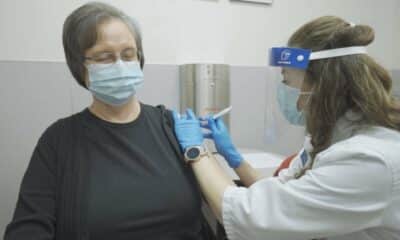Mississippi Today
Mississippi to receive $1.2 billion for broadband internet access

Mississippi will receive $1.2 billion in federal money to expand high-speed internet, President Joe Biden announced Monday.
The state's share of the money — part of $42 billion in spending to expand access nationwide — is part of the $1.2 trillion Infrastructure and Jobs Act, passed by Congress in 2021.
The announcement of funding through the federal Broadband Equity, Access and Deployment funding came in a press conference at the White House on Monday. Biden likened the efforts to expand broadband access nationwide by 2030 to work to provide electricity to rural America in the 1930s.
Sally Doty, director of the Mississippi office of Broadband Expansion and Accessibility of Mississippi, was at the White House on Monday for the announcement.
“The amount is in the range I expected,” Doty said. “It was driven by the large number of high cost (of providing access) areas in the state. The BEAM office is working through all the numerous requirements to get the money out as fast as we can … We know this funding will be transformational for so many Mississippians and their communities.”
The award was based on the number of homes and businesses lacking high-speed internet and estimated costs of expanding it. Mississippi has an estimated 300,000 unserved and 200,000 underserved homes and businesses. BEAM was created to administer Mississippi's broadband expansion through a competitive grant program. It will now submit a five-year action plan for the federal funding in late summer.
“Thanks to President Biden's Investing in America agenda, we are working with Gov. (Tate) Reeves to close the digital divide so that everyone in Mississippi will be able to participate in the digital economy and realize the benefits of broadband access,” said national Secretary of Commerce Gina Raimondo.
Reeves in a statement on Monday said: “People want to live in areas where they can access broadband and that are connected. That's why we'll continue to aggressively build out broadband infrastructure to every region of our state, so all Mississippians can harness the opportunities technology provides them.”
U.S. Sen. Roger Wicker and U.S. Rep. Bennie Thompson were the only members of Mississippi's congressional delegation to vote for the Infrastructure Act.
Thompson, in a statement, said: “I was the only congressman from Mississippi in the House of Representatives to cast a ballot in favor of the infrastructure spending package. I am proud to have taken a stand for the people of my state and to have been an advocate for responsible investment in our nation's future. Broadband access is essential for our country's progress, and this spending package is going to get us off the bottom and bring us forward into an era of greater technological advancement.”
Wicker said he was a key negotiator of the Infrastructure Act and “also worked for years as the lead Republican on the Senate Commerce, Science and Transportation Committee to ensure Mississippi's lack of broadband coverage was accurately reflected in national coverage maps.” He said early versions of federal map incorrectly inflated Mississippi's coverage.
“I am thrilled at this announcement and, and I will continue working with our leadership to ensure that every dollar is put to work connecting all corners of the state,” Wicker said.
Doty continues to urge Mississippians to contribute to the state broadband map at broadbandms.com, where people can take a speed test that will log lagging service into the map.
The Mississippi Center for Justice, a nonprofit public interest law firm, recently filed comments with the federal government over concerns that disadvantaged areas of the state — such as the Delta — might be overlooked as the state expands broadband service. MCJ requested better guidance to the state from the feds and better notification to unserved areas to ensure this doesn't happen.
“BEAM has struggled to reach communities in the Mississippi Delta, a predominantly rural and Black region,” MCJ wroted. “The Delta's barriers have resulted in low engagement with the mapping tool (which has) caused Delta communities' broadband needs to be underrepresented in (maps).” The group called on federal leaders “to be cognizant of news deserts in rural and small communities when forming guidance of community-based notification.”
MCJ also noted that previous state grant programs expanding access were mostly concentrated in north Mississippi that, while rural, does not suffer the levels of poverty of the Delta.
This article first appeared on Mississippi Today and is republished here under a Creative Commons license.
Did you miss our previous article…
https://www.biloxinewsevents.com/?p=252355
Mississippi Today
Renada Stovall, chemist and entrepreneur
Renada Stovall sat on the back deck of her rural Arkansas home one evening, contemplating life when she had a life-altering epiphany…
“I gotta get out of these woods.”
She heard it as clear as lips to her ear and as deep as the trees surrounding her property. Stovall's job as a chemist had taken her all over the country. In addition to Arkansas, there were stints in Atlanta, Dallas and Reno. But she was missing home, her parents and friends. She also knew, she needed something else to do.
“I thought, what kind of business can I start for myself,” said Stovall, as she watered herbs growing in a garden behind her south Jackson home. Some of those herbs are used in her all-natural products. “I know when I lived in Reno, Nevada, where it's very hot and very dry, there really weren't products available that worked for me, my hair, and my skin suffered. I've got a chemistry degree from Spelman College. I took the plunge and decided to create products for myself.”

In 2018, Stovall's venture led to the creation of shea butter moisturizers and natural soaps. But she didn't stop there, and in December 2022, she moved home to Mississippi and got to work, expanding her product line to include body balms and butters, and shampoos infused with avocado and palm, mango butter, coconut and olive oils.
Nadabutter, which incorporates Renada's name, came to fruition.

Stovall sells her balms and moisturizers at what she calls, “pop-up markets,” across the state during the summer. She's available via social media and also creates products depending on what of her ingredients a customer chooses. “My turmeric and honey is really popular,” Stovall added.
“The all-natural ingredients I use are great for conditioning the skin and hair. All of my products make you feel soft and luscious. The shea butter I use comes from West Africa. It's my way of networking and supporting other women. And it's my wish that other women can be inspired to be self-sufficient in starting their own businesses.”





This article first appeared on Mississippi Today and is republished here under a Creative Commons license.
Mississippi Today
On this day in 1954
MAY 17, 1954

In Brown v. Board of Education and Bolling v. Sharpe, the U.S. Supreme Court unanimously ruled that the “separate but equal” doctrine in Plessy v. Ferguson was unconstitutional under the 14th Amendment, which guaranteed equal treatment under the law.
The historic decision brought an end to federal tolerance of racial segregation, ruling in the case of student Linda Brown, who was denied admission to her local elementary school in Topeka, Kansas, because of the color of her skin.
In Mississippi, segregationist leaders called the day “Black Monday” and took up the charge of the just-created white Citizens' Council to preserve racial segregation at all costs.
This article first appeared on Mississippi Today and is republished here under a Creative Commons license.
Mississippi Today
Every university but Delta State to increase tuition this year
Every university in Mississippi is increasing tuition in the fall except for Delta State University.
The new rates were approved by the governing board of the eight universities, the Institutions of Higher Learning Board of Trustees, at its regular meeting Thursday.
The average cost of tuition in Mississippi is now $8,833 a year, a roughly 3% increase from last year. Students can expect to pay tuition ranging from $7,942 a year at Mississippi Valley State University to $10,052 a year at Mississippi State University.
In recent years, universities have cited inflation and rising insurance costs as reasons for the tuition increases. At Thursday's meeting, the board heard a presentation on how property insurance is becoming more expensive for the eight universities as Mississippi sees more tornadoes and storms with severe wind and hail.
READ MORE: Tuition increases yet again at most public universities
But it's an ongoing trend. Mississippi's public universities have steadily increased tuition since 2000, putting the cost of college increasingly out of reach for the average Mississippi family. More than half of Mississippi college students graduated with an average of $29,714 in student debt in 2020, according to the Institution for College Access and Success.
At Delta State University, the president, Daniel Ennis, announced that he will attempt to avoid tuition increases as the regional college in the Mississippi Delta undergoes drastic budget cuts in an effort to become more financially sustainable.
“We will resist tuition increases so that our most economically vulnerable students can continue to have access to the opportunities that a college degree can provide,” he wrote in a memo to faculty and staff on Monday. “We will move beyond basic survival and into a place where we have the capacity to take better advantage of our undeniable strengths.”
Delta State didn't increase tuition last year, either. Officials have been concerned the university is becoming too pricey for the students it serves.
Tuition for the 2024-25 academic year, by school:
- Alcorn State University: $8,105
- Delta State University: $8,435
- Jackson State University: $8,690
- Mississippi State University: $10,052
- Mississippi University for Women: $8,392
- Mississippi Valley State University: $7,492
- University of Mississippi: $9,612
- University of Southern Mississippi: $9,888
This article first appeared on Mississippi Today and is republished here under a Creative Commons license.
-
SuperTalk FM5 days ago
Martin Lawrence making 3 stops in Mississippi on comedy tour
-
Our Mississippi Home4 days ago
Beat the Heat with Mississippi’s Best Waterparks
-
Our Mississippi Home5 days ago
Charlie’s U-Pik: Opening Soon for the Summer Season
-
SuperTalk FM19 hours ago
State auditor cracking down on Mississippians receiving unemployment benefits
-
Mississippi News Video7 days ago
Local dentists offer free dental care in Amory
-
Mississippi News Video3 days ago
Jackson has a gang problem
-
Kaiser Health News4 days ago
Medicaid ‘Unwinding’ Decried as Biased Against Disabled People
-
Mississippi Today7 days ago
On this day in 1968





































